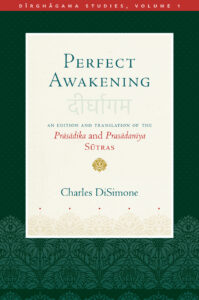 The Long Discourses, or Dīrghāgama, is a collection of the Buddha’s most well-known sermons that has circulated widely in the Buddhist world. Parallel collections in Pali and Chinese have long been known to scholars and practitioners, but it was not until the 1990s that a Mūlasarvāstivāda manuscript transmitted in Sanskrit was discovered, a major find with the potential to reshape our understanding of Buddhism in India and Central Asia. The present volume is the first in a three-volume series to present this rare manuscript, with a study, translation, and critical edition of two of the sūtras in the collection.
The Long Discourses, or Dīrghāgama, is a collection of the Buddha’s most well-known sermons that has circulated widely in the Buddhist world. Parallel collections in Pali and Chinese have long been known to scholars and practitioners, but it was not until the 1990s that a Mūlasarvāstivāda manuscript transmitted in Sanskrit was discovered, a major find with the potential to reshape our understanding of Buddhism in India and Central Asia. The present volume is the first in a three-volume series to present this rare manuscript, with a study, translation, and critical edition of two of the sūtras in the collection.
Around thirty years ago, a rare bookseller in London parceled out birchbark leaves of a manuscript bundle representing an ancient scripture that had likely been unearthed in the Gilgit region of Pakistan. Even as the fragile folios entered collections in Japan, Norway, and the United States, they were identified by a scholar as belonging to the previously lost Sanskrit Dīrghāgama, the Collection of Long Discourses of the Buddha, of the Mūlasarvāstivādins. Although the forty-seven separate sūtras in this āgama have parallel transmissions extant in the Pali Digha-nikāya and the Chinese Chang ahan jing, this Sanskrit witness, copied in the eighth century, was previously known only from partial quotations and from translations in Tibetan and Chinese. The discovery was thus one of major significance in the study of Buddhist literature.
Charles DiSimone‘s book, one of the first presentations of this manuscript in English, provides a translation, critical reconstruction, and study of two of the sūtras in the Dīrghāgama: the Prāsādika-sūtra and the Prasādanīya-sūtra. Both sūtras offer what appears to have been late teachings of the Buddha on the nature of faith and the preeminence of the Buddha over all other teachers. The Buddhist community was evidently concerned about the coming passing of the Buddha and, in these scriptures, laid the foundation for the tradition to continue with the Buddha at the center. The Prasādanīya-sūtra, in particular, is the locus classicus for the doctrine that only one Buddha and his teachings can exist in a world system at a time, ensuring that the Buddhist community would not be tempted to follow any other teacher who had not realized perfect awakening but would hold true to the Dharma of the Buddha.
These sūtras from the Mūlasarvāstivāda tradition are made available to the public for the first time in over a thousand years with philological reconstructions and translations. They are accompanied by synoptic parallels from the corresponding Pali Long Discourses of the Theravāda tradition and the Chinese Long Discourses of the Dharmaguptaka tradition along with citations and related passages from elsewhere in Buddhist literature. In addition, the work contains a full transliteration of the birchbark folios, an introduction to the two sūtras with a study providing paleographic and textual analysis of the manuscript, and notes providing insight and explanation throughout.
Book information
- Hardcover
- 504 pages, 6 x 9 inches
- ISBN 9781614296539
- This book will be available in August 2024 from Wisdom Publications